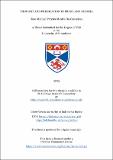Files in this item
Thought and predication in Frege and Russell
Item metadata
| dc.contributor.advisor | Sullivan, Peter M. | |
| dc.contributor.advisor | Johnston, Colin | |
| dc.contributor.author | Pereira Mestre Da Conceicao, Jose Manuel | |
| dc.coverage.spatial | 179 | en_US |
| dc.date.accessioned | 2023-05-25T09:00:27Z | |
| dc.date.available | 2023-05-25T09:00:27Z | |
| dc.date.issued | 2023-06-12 | |
| dc.identifier.uri | https://hdl.handle.net/10023/27670 | |
| dc.description.abstract | This dissertation offers a reappraisal of how Russell’s views about thought and predication around the time of his Principles of Mathematics relate to Frege’s own theorizing about those topics. It does so by telling a story about the encounter of Russell’s world with Frege’s logic. The main protagonist in that story is Russell. Briefly, the story is as follows. Russell inherited from Moore the elements of the largely atomistic worldview that he upheld around 1903. Underlying that worldview was a model of term combination that we may call the building blocks model. That model was primarily targeted at the composition of atomic propositions (chapter 3). In one respect, the model proved advantageous, in that it prevented Russell from mistaking propositional functions (or what they stand for) for properties in the traditional sense (chapters 1 and 4). In other respects, it had a deleterious effect on Russell’s theorizing. In fact, it would break down even in the case of atomic propositions themselves (chapter 4). However, it was as a model for the kinds of complexity introduced by propositional functions (chapter 5) and that-clauses (chapter 6) that it proved seriously inadequate. By contrast, Frege’s model of complexity derived entirely from his account of generality, and was therefore perfectly suited to functions (chapter 2). Yet, Frege’s relative indifference towards ontological questions, or at any rate his lack of a developed picture of the world comparable to Russell’s, meant that he could avoid any deep commitments with regard to the other two cases (chapters 2 and 7). | en_US |
| dc.description.sponsorship | "This work was supported by FCT – Fundação para a Ciência e a Tecnologia, grant number SFRH/BD/129498/2017. I am grateful for additional support from the School of Arts and Humanities at the University of Stirling, the St Andrews and Stirling Graduate Programme in Philosophy, and the Centre for Philosophy at the University of Lisbon."--Funding | en |
| dc.language.iso | en | en_US |
| dc.rights | Creative Commons Attribution-NonCommercial-NoDerivatives 4.0 International | * |
| dc.rights.uri | http://creativecommons.org/licenses/by-nc-nd/4.0/ | * |
| dc.subject | Frege | en_US |
| dc.subject | Russell | en_US |
| dc.subject | Thoughts | en_US |
| dc.subject | Simple predicates | en_US |
| dc.subject | Complex predicates | en_US |
| dc.subject.lcc | BC181.P48 | |
| dc.subject.lcc | ||
| dc.subject.lcsh | Russell, Bertrand--1872-1970 | en |
| dc.subject.lcsh | Frege, Gottlob, 1848-1925 | en |
| dc.subject.lcsh | Predicate (Logic) | en |
| dc.title | Thought and predication in Frege and Russell | en_US |
| dc.type | Thesis | en_US |
| dc.contributor.sponsor | Fundação para a Ciência e a Tecnologia (FCT) | en_US |
| dc.type.qualificationlevel | Doctoral | en_US |
| dc.type.qualificationname | PhD Doctor of Philosophy | en_US |
| dc.publisher.institution | The University of St Andrews | en_US |
| dc.publisher.department | The University of Stirling | en_US |
| dc.identifier.doi | https://doi.org/10.17630/sta/478 | |
| dc.identifier.grantnumber | SFRH/BD/129498/2017 | en_US |
The following licence files are associated with this item:
This item appears in the following Collection(s)
Except where otherwise noted within the work, this item's licence for re-use is described as Creative Commons Attribution-NonCommercial-NoDerivatives 4.0 International
Items in the St Andrews Research Repository are protected by copyright, with all rights reserved, unless otherwise indicated.


